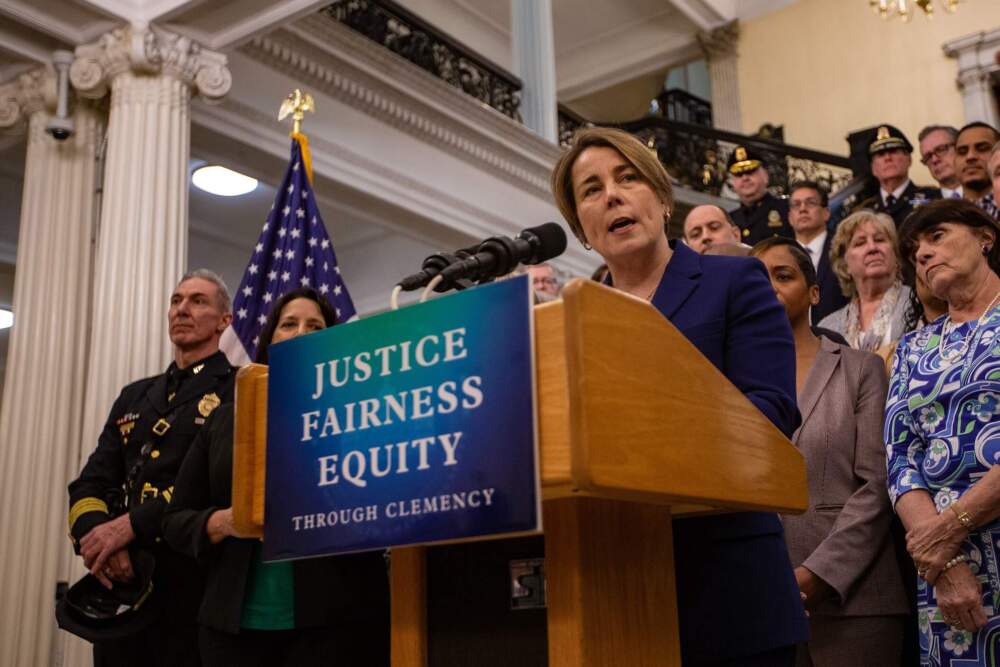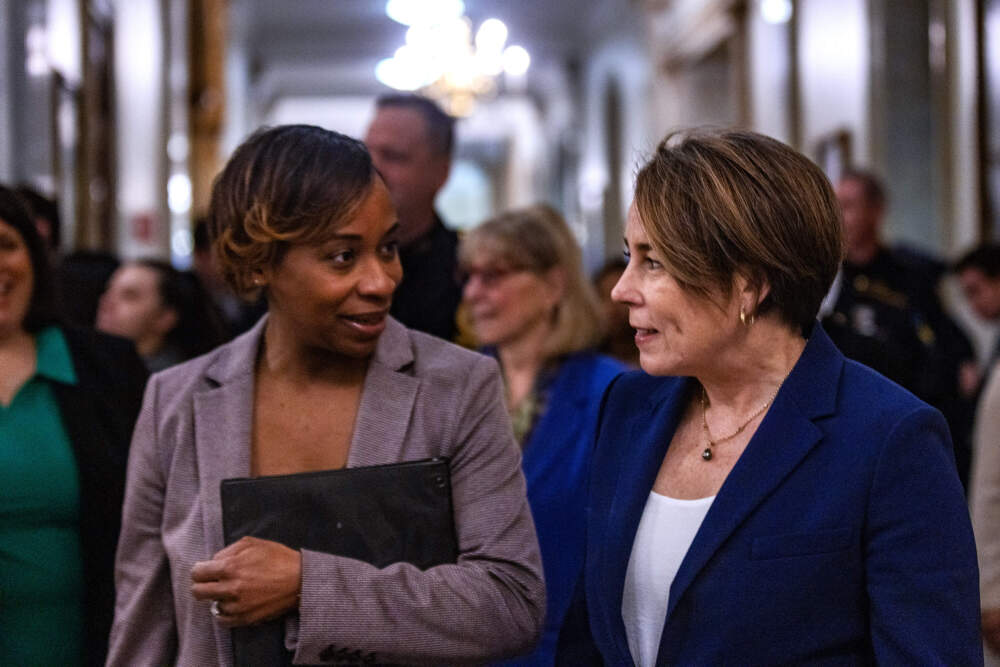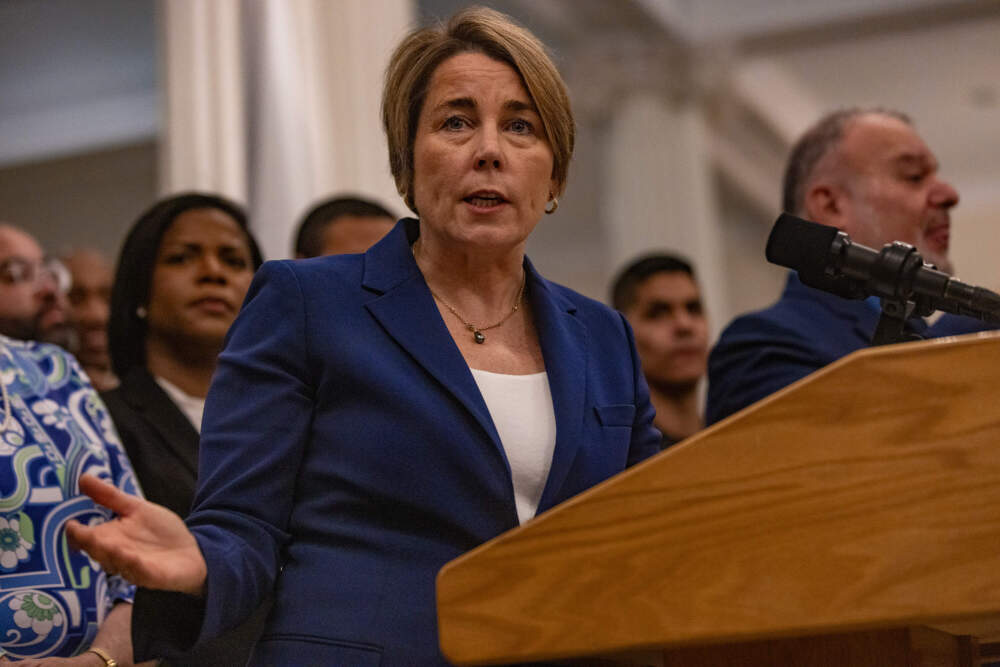Advertisement
Healey announces sweeping pardons for simple possession of cannabis

In a move she described as "nation-leading" in scope and ambition, Gov. Maura Healey on Wednesday unveiled plans to pardon all people convicted of simple marijuana possession in Massachusetts.
If approved, the pardon would forgive all state court misdemeanor convictions for possession of marijuana before March 13, 2024. It would not apply to charges of distribution, trafficking, or operating a motor vehicle under the influence.
Healey's office said the pardon could affect "hundreds of thousands" of people in Massachusetts, though the exact number is unknown.
“The reason we do this is simple: justice requires it," Healey said. She called the plan "the most sweeping cannabis pardon announced by any governor in the United States."
Healey said the pardon will be automatic for most people. Those who need proof of the pardon before their record is updated, or who believe they may have been passed over, can apply using an online form.
The announcement was met with applause from state elected officials, criminal justice reform advocates, people impacted by simple possession convictions and members of law enforcement who joined Healey for the announcement on the grand staircase inside the Massachusetts State House.
The plan still needs sign-off from the Governor's Council, the elected eight-member body that approves pardons and judicial confirmations.

Healey said the decision was about equity, noting that communities of color have been disproportionately targeted by law enforcement for drug possession. A 2016 report from the ACLU of Massachusetts found that while Black people represented only 8% of the state's population, they comprised 24% of marijuana possession arrests.
"We can be certain that this pardon will redress some of the harm those disparities have caused in Massachusetts and we'll continue to do all that we can to eliminate racial injustice throughout our systems," Healey said.
Healey in her 2022 campaign for governor had promised to pardon state convictions for simple marijuana possession. This week's announcement came after President Biden ordered pardons for people with federal simple possession convictions, and encouraged governors across the country to do the same.

Past marijuana convictions and charges — even charges that were eventually dismissed — can show up on background checks, making it hard for those affected to secure jobs or housing. This pardon does not cover people who have been arrested or charged without a conviction, according to Healey's office; those records will still exist.
Nor does it mean the conviction will completely disappear from somebody’s record. Instead, the pardon will be reflected alongside the original offense.
“You can pardon somebody all you want, but if there’s still a paper trail for the conduct, and there’s still stigma attached to the conduct, somebody can still find it,” said Chris Dearborn, a law professor at Suffolk University and the director of the Suffolk Defenders Program.
Dearborn said expungement is the only way to truly remove a criminal conviction from the record. But he added Healey’s high-profile blanket pardon “sends a really powerful and appropriate message.”
People in Massachusetts already are able to expunge certain marijuana-related convictions, following a landmark 2018 criminal justice reform law. But advocates criticize the process as bureaucratic and inaccessible, and multiple reports find that it's rarely used.
“I hope the next step will be automatic expungement to actually clear these records,” said Shaleen Title, director of the Parabola Center for Law and Policy and a former commissioner of the state Cannabis Control Commission.
Devin Alexander spoke at the pardoning announcement and said his arrest for marijuana possession when he was 17 derailed his plans to join the U.S. Air Force. The Quincy native was later part of the state Cannabis Control Commission's Social Equity Program, which gives state residents affected by the war on drugs training to work in the cannabis industry.
Alexander said he appreciated the governor's move, but that it is "way past due."
"Pardoning for simple possession is great, but it's just the first step," he said. "We need to get to a point where we pardon individuals for all cannabis-related crimes."
Middlesex District Attorney Marian Ryan said Healey's pardon is an example of how the state has been reforming the criminal justice system.
“We've been working really hard in Massachusetts to be much more thoughtful about how can we really be smart about preserving public safety, but at the same time lessening the impact of the criminal system on people's lives," Ryan told WBUR. "This is an important part of that.”
Congresswoman Ayanna Pressley in a statement said she supported Healey's move and encouraged the Governor's Council to "swiftly" approve the blanket pardon.
"Our work to transform our criminal legal system to center justice, equity and decarceration is ongoing, but I am grateful that Massachusetts and our Governor are taking critical steps," Pressley said.
Several members of the Governor's Council stood with Healey during her announcement Wednesday. "It's the right thing to do," council member Paul DePalo said after the speech. "I can't speak for the other members but I do know that I'm not the only one who's enthusiastic about this."
The Governor's Council is set to meet again at the end of the month.
Healey's use of her office's pardon power is a major departure from her recent predecessors. Healey pardoned 13 people in her first year — the most since former governor Michael Dukakis. Gov. Charlie Baker pardoned 15 people during his entire eight years in office.
Massachusetts voters legalized recreational marijuana through a ballot question in 2016. The cannabis industry has since surpassed $5.65 billion in gross sales in the state.
This story has been updated with additional reporting. WBUR's Simón Rios and Katie Cole contributed to this report.
This article was originally published on March 13, 2024.
